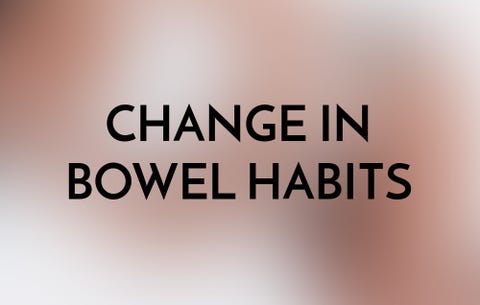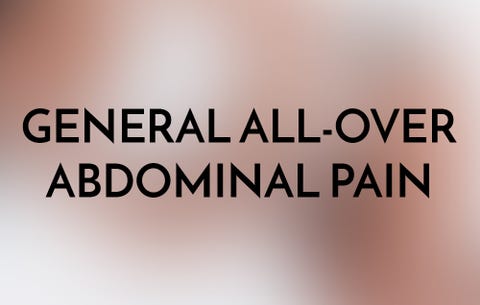Ibs Feels Better After Pooping Then Comes Back
To state the obvious, poop problems are the worst. While cramping, constipation, and diarrhea are a drag for everyone, those who suffer from irritable bowel syndrome (IBS) have to live with those symptoms on a daily basis. "IBS is a gastrointestinal syndrome characterized by chronic abdominal pain and altered bowel habits in the absence of any organic cause," says Niket Sonpal, M.D. "It is the most commonly diagnosed gastrointestinal condition. The prevalence of IBS in the United States is estimated from population-based studies to be approximately 10 to 15 percent but, in my experience, I feel the prevalence is much higher."
Unfortunately, women are twice as likely as men to have IBS, according to the U.S. Department of Health and Human Services. Women can attribute their likelihood of getting IBS to the fact that hormones contribute to flare-ups and estrogen and progesterone both rise and fall during the monthly menstrual cycle, says Sonpal. Because these hormone receptors are found in the G.I. tract, their fluctuations manifest symptoms. Furthermore, women's symptoms can differentiate from one another because, in addition to hormonal fluctuations, IBS flare-ups can be influenced by emotional health and the gut's microbiome as well.
IBS is what Sonpal calls a diagnosis of exclusion, meaning a physician should rule out all other possible causes of symptoms first. Because of that and the way women uniquely experience IBS, it can be difficult to diagnose. After all, how do you tell if it's IBS or intense period cramps or anxiety?
Here are some classic symptoms that can help you tell what's what:

Emily Tiberio
Constipation that lasts for days or weeks and is followed by a bout of diarrhea is a classic sign of IBS, says Sonpal. These polar extremes are often exasperated in IBS patients due to both stress, anxiety or even depression. This why many women feel an improvement of IBS symptoms after starting yoga, regular exercise, or seeking therapy, he says. If the alternating between symptoms stop and you start experiencing dominantly extreme diarrhea or extreme constipation, it's a good idea to see a physician to rule out anything more serious. (Kick-start your new, healthy routine with Women's Health's 12-Week Total-Body Transformation!)
RELATED: 6 Warning Signs Of Stomach Cancer That Have Nothing To Do With Pain

Emily Tiberio
We've established that IBS will cause changes in your bowel habits but those bowel movements (either diarrhea or constipation) should be painless defecation. Cramping can occur, but you should not experience any rectal pain, says Sonpal. If you do, that is a sign something else is going on. For many women, pain while pooping or severe straining is a sign of endometriosis and should prompt a visit to a physician.

Emily Tiberio
Those with IBS generally experience widespread abdominal pain. That pain is commonly from abdominal cramping of the small and large bowel, says Sonpal. It becomes worse after eating and is relieved by passage of a bowel movement or passing gas. IBS pain is never focal to one region of the belly or severe or sharp. When the pain becomes localized, sharp, or unrelenting, that is not IBS, but a sign of something more severe. Similar to IBS, menstrual cramps can be felt all over, but unlike period cramps, IBS pain rarely accompanies back pain and is paired with a change in bowel habits.
RELATED: How to Poop Politely at Work, on Planes, and at a Guy's Place

Emily Tiberio
IBS symptoms occur during the day as they are brought on by stress and food, but at night when you sleep you should be "stress free" (and you obviously aren't eating). Hence, no IBS symptoms. Typically IBS symptoms are their worst at the end of the day when patients feel heavy and bloated. If you begin experiencing symptoms at night, they may be unrelated to IBS and you should see a doctor.
Watch a hot doc explain whether your anxiety is serious:

Emily Tiberio
The bacteria that populates our guts is so important to every aspect of our health. Once the friendly bacteria that helps digest your food and protect the gut lining becomes imbalanced, digestive and immune capabilities are compromised, says Sonpal. That imbalance can potentially lead to IBS with symptoms such as gas bloating and "looking pregnant." This kind of retention is also seen in menstruation from hormonal imbalances of estrogen and progesterone, but the gas bloating of IBS is always after eating, he says.
RELATED: 7 Things Your Ob-Gyn Won't Tell You…But Really Wants To

Emily Tiberio
One of the most annoying symptoms of IBS is that people develop food sensitivity. While it isn't a true allergy, certain foods exacerbate their symptoms more than others. Sonpal says this is because those foods are taken up by the bad bacteria and turned into gas—which, of course, has to come out. Sometimes that gas accompanies diarrhea. Some of the most common food triggers for IBS patients are wheat, gluten, dairy, corn, sugar, chocolate, coffee, tea and citrus fruits, says Sonpal. If you develop rashes, difficulty with swallowing, or breathing with food intake, then you should see a doctor immediately as this is not sensitivity to food but a full-on allergy.

Emily Tiberio
Those who suffer from IBS will typically notice mucus either on their toilet paper or in the bowl with the stool, says Sonpal. Mucus is produced by the colon and is a part of the normal physiologic process. While everyone can experience this from time to time, it's usually increased in IBS patients. Blood in your stool, however, is not normal and always means you should find a doctor stat.
This content is created and maintained by a third party, and imported onto this page to help users provide their email addresses. You may be able to find more information about this and similar content at piano.io
Ibs Feels Better After Pooping Then Comes Back
Source: https://www.womenshealthmag.com/health/a19919457/irritable-bowel-syndrome-symptoms/